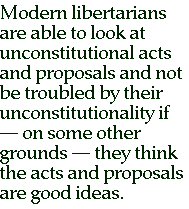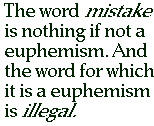inevitable in another article.)
Holcombe begins: "Ludwig von Mises, Friedrich Hayek, and Milton Friedman, perhaps the best-known
twentieth-century academic defenders of liberty, envisioned a role for limited government in
protecting liberty." So far, so good. But the next words out of his mouth are: "Friedman's (1962)
defense of freedom includes proposals for a negative income tax and school vouchers."
One might be forgiven for wondering just how a negative income tax (also known as the "guaranteed
annual income") and school vouchers protect liberty. Friedman is also notorious for other
questionable proposals, e.g., the so-called privatization of Social Security and a continued low-level
inflation that is said to be necessary to stabilize the currency and that requires the existence of some
kind of central bank. And, of course, as a Treasury employee during World War II Friedman helped
craft the system of withholding income for the purposes of collecting income taxes.
I am not now arguing whether Friedman's work has earned him a reputation for being one of the "best-known academic defenders of liberty." Policy-wonk defenses of these recommendations by him attempt
to defend that reputation; certainly his series (with his wife) Free to Choose and his eye-opening chapter on medical licensing in Capitalism and Freedom would have to be counted in his
favor.
Holcombe starts by talking about a "defense of freedom" and finds himself considering welfare
payments and federal control of the schools as something that can be "included" in that defense, rather
than as something that contradicts that defense. But even that is not my focus here.
My focus here is that phrase limited government. Holcombe concludes his article by saying that
"it is worth studying how government institutions can be designed to minimize their negative impact
on liberty." He does not specifically mention a constitution as one part of that study, but if "the rule of
law" said to be provided by a constitution is not part of it, it is difficult to anticipate what he might
mean. And the phrase limited government normally suggests a constitution that is
supposed to do the limiting.
The point of listing Friedman's departures from what is derogatorily called "pure" libertarianism or
the "pure" free market is that it does not seem to bother his libertarian admirers that those
departures are also — one and all — unconstitutional.
 Let us concede that, prima facie arguments to the contrary, a negative income tax advances the cause of
liberty or that a central bank actually serves the working of a free market. Let us make similar
concessions in respect of Friedman's other recommendations. Where are the voices that object, "They
may be good ideas, but the U.S. government has no authority to implement them"? Where are the
voices that reply, "These are excellent proposals. Let us pass an amendment to the Constitution so that
they will be legal"?
Let us concede that, prima facie arguments to the contrary, a negative income tax advances the cause of
liberty or that a central bank actually serves the working of a free market. Let us make similar
concessions in respect of Friedman's other recommendations. Where are the voices that object, "They
may be good ideas, but the U.S. government has no authority to implement them"? Where are the
voices that reply, "These are excellent proposals. Let us pass an amendment to the Constitution so that
they will be legal"?
Maybe I've missed them, but I don't
remember ever hearing them. I hear voices urging that such measures be passed into law, but laws
that are passed by a Congress exceeding its authority are not legitimate, even on constitutional
grounds. Or perhaps I should say, especially on constitutional grounds.
In other words, modern libertarians are able to look at unconstitutional acts and proposals and not be
troubled by their unconstitutionality if — on some other grounds — they think the acts
and proposals are good ideas.
It is bad enough that most writers, politicians, and citizens don't much care whether political
proposals or actions are illegitimate. We have come to accept this, more or less, or at least to expect
it. But that champions of limited government can just shrug these usurpations off, apparently not even
noticing that they are usurpations, is another nail in the coffin of constitutionalism as a viable theory
of government.
 It also illustrates what I have written elsewhere: that constitutions are
just an attempt at "law control," and they work just as well as other forms of regulation. It
illustrates, too, the truth of the Russian proverb "A talon is caught; the bird is lost."
It also illustrates what I have written elsewhere: that constitutions are
just an attempt at "law control," and they work just as well as other forms of regulation. It
illustrates, too, the truth of the Russian proverb "A talon is caught; the bird is lost."
© 2004 by WTM Enterprises. All
rights reserved.
Did you like this
column? If you think it was worth a couple of bucks, please hit the PayPal logo
and take it from there. Anything would be most appreciated — we're quite
serious about that "couple of bucks" — and would help assure a future for
TLD.
Notice to visitors who came straight to this document
from off site: You are deep in The Last Ditch. You should check out our home page and table of
contents.
 Constitutionalism's friends keep reinforcing my reasons for rejecting constitutionalism. To explain,
and for the purposes of this discussion, I am going to pretend that Lysander Spooner has not demonstrated that
the U.S. Constitution has no authority whatever. I am going to pretend that it is authoritative and that
laws passed in accordance with it are legitimate; the flip side is that laws passed that are not in
accordance with it are not legitimate.
Constitutionalism's friends keep reinforcing my reasons for rejecting constitutionalism. To explain,
and for the purposes of this discussion, I am going to pretend that Lysander Spooner has not demonstrated that
the U.S. Constitution has no authority whatever. I am going to pretend that it is authoritative and that
laws passed in accordance with it are legitimate; the flip side is that laws passed that are not in
accordance with it are not legitimate. Objectivists do not normally resort to
euphemisms, but in the sentence "This delegation is almost certainly a mistake, but it does not change
the fact that a legitimate authority has openly declared the war," the word mistake is nothing if
not a euphemism. And the word for which it is a euphemism is illegal. The corresponding action
by a president accepting the power so delegated is also not a mistake. It is a usurpation.
One would never expect to read such a cavalier euphemism if an Objectivist were writing about
Congress's delegating law-writing powers to a regulatory agency (e.g., the Commerce Department or
the FCC).
Objectivists do not normally resort to
euphemisms, but in the sentence "This delegation is almost certainly a mistake, but it does not change
the fact that a legitimate authority has openly declared the war," the word mistake is nothing if
not a euphemism. And the word for which it is a euphemism is illegal. The corresponding action
by a president accepting the power so delegated is also not a mistake. It is a usurpation.
One would never expect to read such a cavalier euphemism if an Objectivist were writing about
Congress's delegating law-writing powers to a regulatory agency (e.g., the Commerce Department or
the FCC). Let us concede that, prima facie arguments to the contrary, a negative income tax advances the cause of
liberty or that a central bank actually serves the working of a free market. Let us make similar
concessions in respect of Friedman's other recommendations. Where are the voices that object, "They
may be good ideas, but the U.S. government has no authority to implement them"? Where are the
voices that reply, "These are excellent proposals. Let us pass an amendment to the Constitution so that
they will be legal"?
Let us concede that, prima facie arguments to the contrary, a negative income tax advances the cause of
liberty or that a central bank actually serves the working of a free market. Let us make similar
concessions in respect of Friedman's other recommendations. Where are the voices that object, "They
may be good ideas, but the U.S. government has no authority to implement them"? Where are the
voices that reply, "These are excellent proposals. Let us pass an amendment to the Constitution so that
they will be legal"?